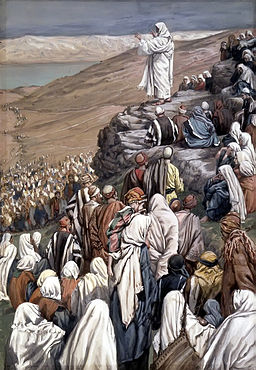Transformation
Sixth Sunday of the Year A (16 February 2014)
Homily of Fr. Paul Panaretos, S.J.
New. The word conjures many things: fresh; clean; clear; youthful; smoothly working; and often, better. Madison Avenue has joined new with improved. New and improved is embedded in our imaginations and shapes the meaning of new for us. Unlike us ancient peoples suspected the new. Knowing their suspicion helps us appreciate the challenges faced by anyone preaching and teaching anything new.
 When recognized people in authority as well as wandering teachers criticized customary patterns of living or spoke of new gods, people did not welcome their opinions or their styles of life. People of the ancient Mediterranean world were eager for true renewal. Yet they were cautious. When others pointed not to the latest—as we would call it—but to something hinting at fundamental transformation, those who heard them cautiously considered. Roman law, after all, imposed a somber public morality. Religious out-looks, uneven though they were throughout the empire, sought freedom from all sorts of oppressive forces, visible and invisible.
When recognized people in authority as well as wandering teachers criticized customary patterns of living or spoke of new gods, people did not welcome their opinions or their styles of life. People of the ancient Mediterranean world were eager for true renewal. Yet they were cautious. When others pointed not to the latest—as we would call it—but to something hinting at fundamental transformation, those who heard them cautiously considered. Roman law, after all, imposed a somber public morality. Religious out-looks, uneven though they were throughout the empire, sought freedom from all sorts of oppressive forces, visible and invisible.
In Judaism commandments were the practical side of the covenant-relationship of God and Abraham and his descendants. In the relation-ship with the people of Abraham God gave them commandments both to shape their moral living and to help them transform the societies in which they lived. Commandments gave people daily, practical guidance: If you choose you can keep the commandments, they will save you. Salvation was no future ideal. Living the commandments would bring people honor and free them from shame; not just any honor. In scripture righteousness named God’s honor.
Living God’s righteousness was living the commandments. To live them involved a problem: one could appear to live by a commandment, You shall not kill, for example; yet the person’s heart could brim with malice. Jesus offered his disciples a true interpretation of the commandments so people could live truly honorable lives: of the heart as well as by behavior. Jesus taught his hearers that salvation was available to those whose hearts matched their behavior.
His call to match heart and behavior frames the voice of Jesus we heard in his gospel. Outwardly observing commandments did not guarantee right relationship with God; it it. Outward but not heartfelt observation of the commandments betrayed right relationship with God. That betrayal had become normal living of many. That included some religious professionals, of all people. For his disciples Jesus revisited and interpreted the commandments with fresh authority.
Anger motivates murder, and insults pave its way. Jesus was not teaching good manners but how to grow more humane with one another. Defusing anger was more important than temple-worship done for show: leave your gift...at the altar, go first and be reconciled with your brother or sister.
In Jesus’ world adultery was a way a man shamed another. A violated woman brought shame to her family, and if her husband took no action against what happened he was thought less a man. Jesus taught his disciples to ignore adultery as a way to challenge a man because adultery lacerated individual dignity of men and women, of families and communities. Unless a marriage is unlawful divorce, as a way not to face marital challenges, fared the same way in his teaching: it devastated lives, too.
In the world of Jesus oath-taking as lying frequently happened in the market but not only there. “Is this fruit fresh?” would get answers like, “By heaven it is!” or “By the temple mount!” or “By the hairs of my head!” All these to close a deal and swindle buyers. In the market and beyond it honesty and direct speech allow relationships to grow and deepen.
 For his disciples Jesus restored and renovated the desires of God for human relationships. Jesus’ teaching drew people to him. His crucifixion dashed their hopes because they understood crucifixion as divine rejection, as it was written: Cursed is anyone who hangs on a tree.1 After Jesus’ resurrection his disciples experienced nothing less than fundamental transformation: their shame at being disciples of a crucified messiah was transformed to honor; their sinfulness to salvation, right relationship with God and others. They experienced release from forces which diminished them and freedom to proclaim their new life. They experienced, as St. Paul put it, God’s wisdom, mysterious, hidden...for our glory.
For his disciples Jesus restored and renovated the desires of God for human relationships. Jesus’ teaching drew people to him. His crucifixion dashed their hopes because they understood crucifixion as divine rejection, as it was written: Cursed is anyone who hangs on a tree.1 After Jesus’ resurrection his disciples experienced nothing less than fundamental transformation: their shame at being disciples of a crucified messiah was transformed to honor; their sinfulness to salvation, right relationship with God and others. They experienced release from forces which diminished them and freedom to proclaim their new life. They experienced, as St. Paul put it, God’s wisdom, mysterious, hidden...for our glory.
Jesus is our wisdom. The commandments continue to offer practical guidance so we may live humane lives. The sacraments nourish our friendship with Jesus. Jesus welcomes our deepening friendship with him to show us how to live God’s wisdom in our society driven more by profit than by honor and by God’s saving wisdom to transform our world.
In your daily 15 minutes with Jesus this week
- Rest in our triune God.
- Ask the disciples to present you to Jesus.
- Praise Jesus for revealing God’s heart and desires.
- Ask Jesus for the grace to live by his teaching more closely.
- Close, saying slowly the Lord’s Prayer. Each time we live more in and by the spirit of Jesus we hallow the name of his Father and ours, and we imprint on God’s desires the traces of our lives.
___________
- Deuteronomy 21.23, the Greek OT available to the Jesus and the first disciples. St. Paul quoted it in his Letter to the Galatians, 3.13.
________________________________________________________________






_-_James_Tissot_-_overall.jpg/415px-Brooklyn_Museum_-_The_Presentation_of_Jesus_in_the_Temple_(La_pr%C3%A9sentation_de_J%C3%A9sus_au_Temple)_-_James_Tissot_-_overall.jpg)
